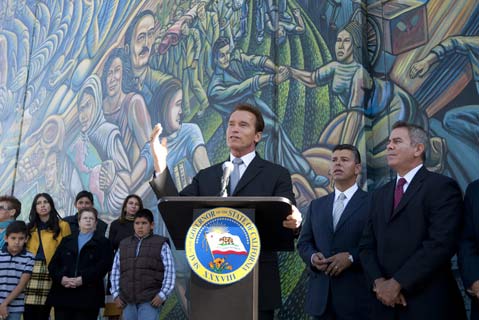Raising Abel
A Look at the Political Impacts of Maldonado's Selection as Lieutenant Governor

Probably no more than 5,999,950 of Jay Leno’s 6 million viewers were scratching their heads Monday night, when Gov. Arnold Schwarzenegger announced on the show that he’d picked Abel Maldonado as California’s lieutenant governor.
Small wonder that Leno’s ratings are tanking.
While viewers who’d tuned in to see Lady Gaga were no doubt baffled, the governor’s nomination of the Republican state senator from Santa Maria carried considerably more interest for California political junkies, insiders, and other hacks. A member of the endangered species known as the “moderate Republican,” Maldonado is a political chameleon, distrusted by many Democrats and despised by many in his own party, whose selection to finish the term of just-resigned Lieutenant Governor John Garamendi is fraught with political implications, from the South Coast to Sacramento:

• In Santa Barbara, Maldonado’s appointment was welcome news to opponents of the controversial PXP offshore oil project. As lieutenant governor, Garamendi last January cast the decisive vote on the State Lands Commission to block a new drilling lease in state waters at Tranquillon Ridge, off the coast of Lompoc. Maldonado voted against it in the Senate last July and, if consistent in his stance, would do the same as lieutenant governor if project supporters bring it back before the Lands Commission. Given his political history, however, using “Maldonado” and “consistent” in the same sentence is pretty much an oxymoron.
• In Santa Maria, Maldonado’s confirmation would set up a wide-open race to succeed him in the 15th Senate District. Voter registration in one of the state’s few competitive districts favors Democrats, but GOP Assemblymember Sam Blakeslee already represents part of the area and would be expected to run. Among the Democrats, former Assemblymember John Laird and his successor, Bill Monning, could also be major contenders.
• In Sacramento, where at least five incumbent lawmakers are eyeing the lieutenant governor’s office, Maldonado’s approval by both houses is far from certain. Senate Democrats face a deal-or-no-deal dilemma: If they vote for him, they open up a GOP-held seat that could bring them within one vote of the two-thirds supermajority needed for budget and tax bills; they also hand over to Republicans a prominent office long held by Democrats.
The resignation of Garamendi, who recently won a special election for Congress just a year before his term ended, also has fueled a debate about whether the lieutenant governor, a $150,000 job with few official duties, is truly necessary.
“We still basically have no real need for a lieutenant governor,” said political scientist Ted Anagnoson, of CSU Los Angeles. “I think the office is a total waste of money.”
Will govern for food: Amid the promises and proposals flying around California’s 2010 campaign for governor, one crucial question remains unanswered: Why in the world would anyone want the job?
The latest study of Sacramento’s intractable financial woes demonstrates that whoever wins the race will confront the biggest reeking mess since Hercules walked into the Augean stables: According to the nonpartisan Legislative Analyst’s Office, California faces estimated deficits of more than $82 billion over the next four years.
Analyst Mac Taylor told the Legislature last week that the current budget, approved just four months ago, is already $6 billion out of balance-a shortfall expected to grow to $21 billion by June 30, when the fiscal year ends. Forecast for the following three years: deficits of $23 billion, $20 billion, and $18 billion.
As a political matter, this means that the first-last?-term of Schwarzenegger’s successor will be shaped by the excruciatingly unenviable task of apportioning pain, as the supply of recession-ravaged tax revenues falls ever further behind the demand for already reduced services. As a practical matter, it means, among other things, that k-12 schools will have fewer teachers and more crowded classrooms, UCSB, SBCC, and other higher-ed students will pay increased fees in exchange for fewer courses, and cuts will deepen in most other state programs.
“The scale of the deficits is so vast,” Taylor reported, “that we know of no way that the Legislature, the governor, and voters can avoid making additional, very difficult choices about state priorities. In the coming years, major state spending programs will have to be significantly reduced. Policymakers will also need to add revenues to the mix.”
Translation: (a) Elected officials, having already reduced state spending to levels of a decade ago, must keep cutting; (b) Minority Republicans in the Legislature are still in the driver’s seat because the two-thirds vote requirement for raising revenue or passing a budget will blunt efforts for higher taxes.



